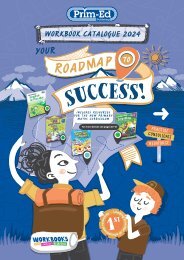PR-2288IRE My Spelling Workbook Teacher Guide - Book B
You also want an ePaper? Increase the reach of your titles
YUMPU automatically turns print PDFs into web optimized ePapers that Google loves.
Additional Activities<br />
Informal Activities<br />
Useful for the reinforcement of the list words in a less formal approach.<br />
Strategy<br />
• Encourage children to ‘have a go’ and take risks with<br />
approximate spelling.<br />
Examples<br />
For example, using ‘have a go’ pads or spelling journals for<br />
children to try out their spelling when writing stories etc.<br />
• Encourage as much reading as possible.<br />
• Break each spelling list into shorter lists based on similar<br />
spelling patterns or themes.<br />
• Longer words can be ‘chunked’ (broken into chunks) to<br />
assist spelling, rather than conventional syllables.<br />
• Make simple designs using the list words written end<br />
to end.<br />
• Encourage children to look at difficult words, focus on<br />
the problem part, close their eyes, then write it.<br />
• Write list words on graph paper, cut out the letters, and<br />
then build the word from the cut-out letters.<br />
• Write the list words, leaving out some letters. Complete<br />
the words the next day.<br />
• Prepare a cloze passage, deleting list words. Children<br />
select the correct word to go in the correct space.<br />
Include different sources of print around the classroom for<br />
children to find correct spelling. For example: opposites,<br />
colours, favourite sayings, days of the week.<br />
For example these list words could be broken up as follows:<br />
he, me, we, be, she;<br />
gum, hum, sum;<br />
yes, no.<br />
For example into – in to. Children should be encouraged to<br />
choose how to chunk the words themselves, so<br />
as to suit each child’s preferred learning style.<br />
Use shapes like circles, triangles and spirals.<br />
For example: the problem part of ‘want’ might be ‘an’ rather<br />
than ‘on’.<br />
Review sample<br />
c<br />
a<br />
For example: c m = come<br />
For example: ‘dog’ and ‘vet’ might fit into:<br />
<strong>My</strong> went to the .<br />
t<br />
c<br />
h<br />
• Use sentence frames to develop a spelling vocabulary of<br />
list words.<br />
For example: We took our cat to the vet.<br />
We took our pup to the vet.<br />
• Use list words to build other words.<br />
For example: using the word ‘am’:<br />
h , j , sw<br />
20 <strong>My</strong> <strong>Spelling</strong> <strong>Workbook</strong> B <strong>Teacher</strong>s <strong>Guide</strong>—Prim-Ed Publishing—www.prim-ed.com

















